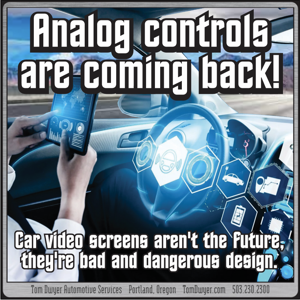Analog controls are coming back!
Car video screens aren’t the future, they’re bad and dangerous design.
Today’s vehicles come with a plethora of modern safety and convenience features the older ones just don’t have. Automatic braking systems, all-around airbags, zonal temperature control… heated seats anyone? But since the late 80’s manufacturers have been modernizing in a way that’s making cars less safe by putting almost all vehicle controls onto touch display screens. Sure, it’s very futuristic, but also inherently distracting. Rather than use touch or muscle memory to activate your climate controls, radio, or even those heated seats, everything’s been integrated into touch screens that require you to look at them, navigate sub menus to the option you want, then keep poking the virtual buttons until it finally accepts your touch. Your attention is forced off the road and onto these screens. 97% of new cars built after 2023 have at least one screen, but 89% of drivers surveyed prefer physical buttons.
We love the new vehicles but sometimes there’s just no school like the old school. Wired Magazine (online) did an excellent deep-dive into a revolution in car design that may bring back the buttons and knobs we all remember…
Rejoice! Carmakers Are Embracing Physical Buttons Again
By Carlton Reid in WIRED, May 5, 2025
Automakers that nest key controls deep in touchscreen menus—forcing motorists to drive eyes-down rather than concentrate on the road ahead—may have their non-US safety ratings clipped next year.
From January, Europe’s crash-testing organization EuroNCAP, or New Car Assessment Program, will incentivize automakers to fit physical, easy-to-use, and tactile controls to achieve the highest safety ratings. “Manufacturers are on notice,” EuroNCAP’s director of strategic development Matthew Avery tells WIRED, “they’ve got to bring back buttons.”
Motorists, urges EuroNCAP’s new guidance, should not have to swipe, jab, or toggle while in motion. Instead, basic controls—such as wipers, indicators, and hazard lights—ought to be activated through analog means rather than digital.
Driving is one of the most cerebrally challenging things humans manage regularly—yet in recent years manufacturers seem almost addicted to switch-free, touchscreen-laden cockpits that, while pleasing to those keen on minimalistic design, are devoid of physical feedback and thus demand visual interaction, sometimes at the precise moment when eyes should be fixed on the road.
A smattering of automakers are slowly admitting that some smart screens are dumb. Last month, Volkswagen design chief Andreas Mindt said that next-gen models from the German automaker would get physical buttons for volume, seat heating, fan controls, and hazard lights. This shift will apply “in every car that we make from now on,” Mindt told British car magazine Autocar.
Acknowledging the touchscreen snafus by his predecessors—in 2019, VW described the “digitalized” Golf Mk8 as “intuitive to operate” and “progressive” when it was neither—Mindt said, “we will never, ever make this mistake anymore … It’s not a phone, it’s a car…”
Click here to read the rest of this excellent article!












